🇦🇺 Australia
🇨🇦 Canada
🇨🇿 Czechia
🇩🇰 Denmark🇪🇪 Estonia
🇮🇪 Ireland
🇮🇱 Israel
🇮🇹 Italy
🇯🇵 Japan
🇲🇽 Mexico
🇵🇱 Poland
🇰🇷 South Korea
🇨🇭 Switzerland
🇬🇧 United Kingdom
🇺🇸 United States of Americaand more
🇦🇺 Australia
🇨🇦 Canada
🇨🇿 Czechia
🇩🇰 Denmark🇪🇪 Estonia
🇮🇪 Ireland
🇮🇱 Israel
🇮🇹 Italy
🇯🇵 Japan
🇲🇽 Mexico
🇵🇱 Poland
🇰🇷 South Korea
🇨🇭 Switzerland
🇬🇧 United Kingdom
🇺🇸 United States of Americaand more
Bisacodyl suppositories (candles) rectal 10 mg 10 pcs.
$12.21
Bisacodyl is a laxative that stimulates colonic peristalsis by irritating the mucosa or by direct stimulation of nerve endings in the submucosal and mucous nerve plexuses.
-
— or —
Composition and form of release
Composition
Active ingredient: bisacodyl;
1 suppository contains bisacodyl 0.01 g (10 mg);
excipients: colloidal anhydrous silicon dioxide, solid fat.
Release form
Rectal suppositories.
Pharmacological properties
Pharmacodynamics.
Causes irritation of the intestinal receptor apparatus, directly affects the intestinal mucosa, enhances its peristalsis and increases mucus secretion in the large intestine. The effect occurs within the first hour.
Pharmacokinetics.
Bisacodyl is a laxative that stimulates colonic peristalsis by irritating the mucosa or by direct stimulation of nerve endings in the submucosal and mucous nerve plexuses.
Bisacodyl is poorly absorbed from the gastrointestinal tract and itself affects the absorption of electrolytes. As a result, increased osmotic pressure in the intestinal lumen retains more water, which leads to softening of feces and facilitating their passage through the colon. In addition, the volume of feces increases, which stimulates peristalsis and facilitates defecation.
Bacterial enzymes in the colon metabolize bisacodyl to the active compound, a diphenol, which is conjugated during the first pass through the liver with glucuronic or sulfuric acid and returned to the intestine via enterohepatic circulation. This process prolongs the action of the drug.
Absorption of bisacodyl after intrarectal administration is minimal. Absorbed bisacodyl is deacetylated in the liver to form a phenolic derivative, which is subsequently excreted in the urine. The portion remaining in the colon is excreted in the feces.
Indication
Short-term symptomatic treatment of constipation, including common constipation and chronic constipation in bedridden and elderly patients, before diagnostic procedures, surgical and obstetric interventions, as well as in the pre- and postoperative period.
Contraindication
Intestinal obstruction; intestinal obstruction; acute diseases of the abdominal cavity, including appendicitis and acute inflammatory bowel diseases; peritonitis; abdominal pain; nausea and vomiting of unknown etiology; Incarcerated hernia; gastrointestinal hemorrhages; spastic constipation; intestinal carcinoma; colitis; acute proctitis; acute hemorrhages; rectal diseases; uterine bleeding; cystitis; severe dehydration; anal fissures or ulcerative proctitis with damage to the mucous membrane; hypersensitivity to bisacodyl and other components of the drug.
Method of administration and doses
Before using the suppository, you must:
- tear off one suppository in the primary packaging along the perforation line of the blister pack;
- Next, you need to pull the edges of the film, tearing it in different directions, and release the suppository from the primary packaging.
The drug is intended for rectal use.
Bisacodyl should only be used for the treatment of adult patients: 1 suppository once a day, usually in the morning. Treatment should not exceed 7 days.
Children. The drug should not be used in children.
Application features
Like other laxatives, bisacodyl should not be used continuously for more than 5 days without clarifying the cause of constipation. Prolonged and excessive use of the drug can cause electrolyte and fluid imbalance, as well as hypokalemia. Long-term use can lead to the formation of addiction, when the act of defecation will be possible only after using a laxative.
Frequent use of bisacodyl in elderly patients may increase asthenia, cause orthostatic hypotension and impaired coordination of movements associated with electrolyte loss. The drug may reduce serum potassium levels.
Dizziness and fainting may occur during defecation, and defecatory syncope and vascular reactions may occur with abdominal pain, which may be related to constipation that prompted laxative use.
There have been isolated reports of abdominal pain and bloody diarrhea observed with bisacodyl, the cause of which may be associated with ischemia of the intestinal mucosa.
Suppositories are not recommended for use in patients with anal fissures, proctitis and ulcerative hemorrhoids, as this may lead to pain and local irritation. Do not use the drug in patients with obstructive bowel diseases or acute conditions such as appendicitis, as well as in patients with inflammatory bowel diseases.
Use during pregnancy or breastfeeding
Bisacodyl is not recommended for use during pregnancy, especially in the first trimester, except in cases where the expected benefit to the mother outweighs the potential risk to the fetus, and only as prescribed by a doctor. There are no sufficient controlled clinical studies in pregnant women.
Bisacodyl is not recommended for use during breastfeeding, except in cases where the expected benefit to the mother outweighs the potential risk to the fetus, and only on medical advice. It is not known whether bisacodyl is excreted in breast milk.
Drivers
The drug does not affect the reaction speed when driving or working with other mechanisms.
Overdose
The use of bisacodyl in high doses can lead to diarrhea, abdominal cramps and clinically significant loss of potassium and electrolytes. Sometimes intestinal atony and congestive inflammation of the rectum can occur.
Prolonged use of laxatives can cause chronic diarrhea, abdominal pain, hypokalemia, secondary hyperaldosteronism, and nephrolithiasis. As a consequence of hypokalemia, renal tubular damage, metabolic alkalosis, and muscle weakness have been reported.
Treatment: fluid replacement therapy and correction of electrolyte imbalance (especially hypokalemia).
Adverse reactions
Immune system disorders: hypersensitivity and allergic reactions, including angioedema and anaphylactic reactions.
Gastrointestinal: discomfort, pain, abdominal cramps, nausea and diarrhea (which may cause excessive loss of water and electrolytes, especially potassium, most often with prolonged use or overdose); vomiting, proctitis, inflammation of the rectal mucosa, intestinal atony, hypokalemia; local irritation of the anal area (pain, burning, bleeding); colitis.
Dehydration can cause muscle weakness, cramps, and hypotension.
Interaction
Bisacodyl enhances the action of cardiac glycosides by reducing serum potassium levels. It also enhances the kaliuretic effect of diuretics and glucocorticoids.
Storage conditions
Store out of the reach of children in the original packaging at a temperature not exceeding 25 ° C. Shelf life – 3 years.
You may also like


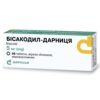


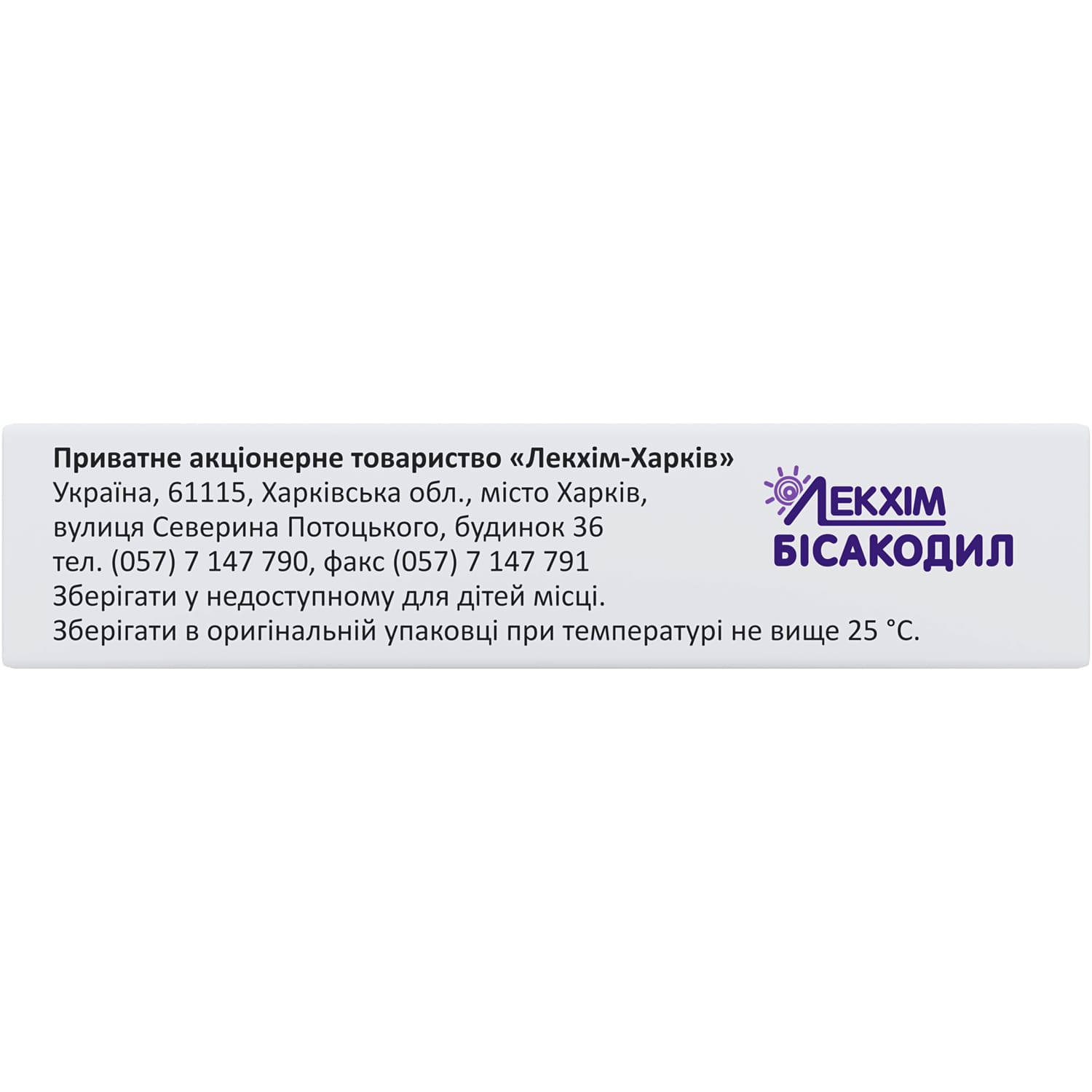

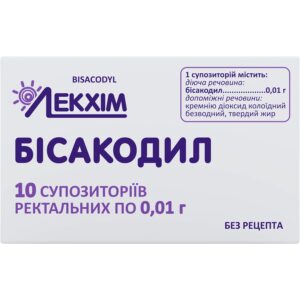

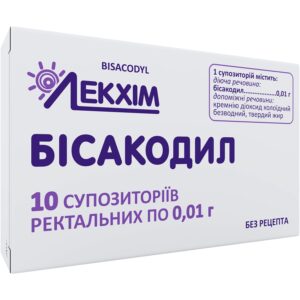
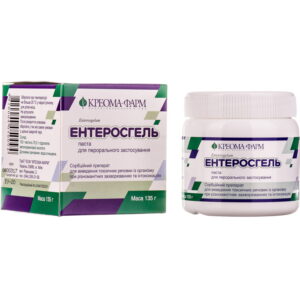

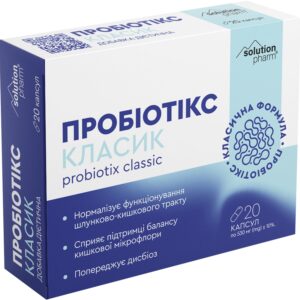
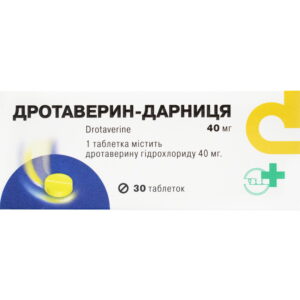
Reviews
There are no reviews yet.